- Home
- Alison Weir
Jane Seymour: The Haunted Queen Page 8
Jane Seymour: The Haunted Queen Read online
Page 8
“I have a sister called Dorothy,” Jane told her.
She tried not to think too much about home as she chatted to the maids around her, swapping stories about their backgrounds and families. Like her, most of them were of the knightly class, except for the Vargas twins, whose father had been some kind of high officer at the court of Spain.
“Bess Chambers seems kind,” she ventured.
“She’s a good sort,” Joan agreed. “Everyone likes her. She’s fair and approachable. If you have a problem, you can always go to her.”
Jane became aware of a rather strident young lady on the opposite table.
“Mistress Nan Stanhope,” Joan said grimly, seeing Jane look across the room to see where the peals of laughter were coming from. The Vargas twins were shaking their heads.
“Her snobbery and pride are intolerable,” Blanche fumed.
“She is impossible,” Isabel muttered.
Nan Stanhope was a few years older than Jane. She had tawny brown hair, a determined pointed chin, cherry-red lips and wide-set eyes. She was attractive in her way, but no great beauty. She was giggling with a young man seated next to her, but when she saw Jane staring at her, she glared.
“She is not popular,” Joan said. “Best not to cross her. She has a terrible temper.”
“She looks as if she likes to be the center of attention,” Jane observed.
“She’s not the only one,” Blanche murmured.
“Shush!” Joan hissed. “Not here!”
Jane tried another mouthful of the rabbit. She was intrigued. “Are you talking about the person who was missing earlier?” she asked in a low voice. “I heard the ladies talking as we left the privy chamber.”
Blanche de Vargas spoke in her ear. “They were talking about a maid-of-honor who is absent tonight. Mistress Anne Boleyn.”
Joan’s mouth settled again into a grim line. “You’ll meet her soon enough, Jane.”
* * *
—
Jane stood watching as the ladies and maids moved deftly around the Queen, unlacing, unhooking and removing her clothes, layer by layer, then attiring her in a night rail of the finest silk embroidered in black-work at the neckline and cuffs. When they had helped her on with a damask nightgown fastened high at the neck, Bess Chambers ordered Jane to comb the Queen’s hair, which, when released from the confines of her hood and unplaited, was of a very great length and the color of faded copper. As she carefully untangled the rippling tresses, Jane saw that they were streaked with gray.
The Queen smiled at her. “You have a gentle touch, Mistress Jane,” she commented. “You must comb my hair again tomorrow.”
Jane caught the fleeting scowl on Nan Stanhope’s face, and the smug, barely suppressed smiles of the others. Her heart sank. She did not want to make an enemy on her first day.
She was exhausted when, at nearly midnight, she ascended the stairs to the dorter, thinking that it could surely not have been this morning that she and Edward had left Maidenhead. The last thing she wanted was to find that Nan Stanhope’s bed was only two away from hers.
“Frideswide Knight sleeps between,” Margery said behind her. “She’s a chamberer—and Nan’s acolyte, always at her beck and call. Would you like me to unlace you, Jane?”
“That would be a kindness.” But as Jane stood there, Nan bore down on her.
“Who do you think you are, little mouse-face, to look down your nose at me at supper and then usurp my duty with the Queen?”
“I meant no offense,” Jane defended herself.
“It was I who asked her to comb the Queen’s hair,” Bess Chambers said quietly.
“That is a privilege reserved for those who have long been in service, as you should know,” Nan Stanhope snapped. “I have served her Grace for sixteen years! I will not have my privilege usurped.”
“In sixteen years you should have learned that you do the duties assigned you by the Mistress of the Maids,” Bess retorted. “I was but giving Mistress Jane here the chance to show us what she can do—and if the Queen wants her to do it again tomorrow, and tomorrow, and tomorrow, I suggest you complain to her.”
Nan’s eyes flashed. “I might just do that. And I might also suggest to her that, having served longer than you, I have more right to be Mistress of the Maids.”
“Heaven forbid!” Dorothy snorted. “Look at yourself and see why Bess was promoted!”
“Shut up!” Nan spat.
“Mistress Nan, I do swear you are more presumptuous than Lucifer!” Blanche de Vargas cried.
“Then you had best beware my pitchfork,” Nan flung back. “Frideswide, give me my night rail.”
“Just go to bed, all of you!” Bess commanded.
Jane said her prayers, doused her candle and lay down exhausted. It seemed she had escaped the conflicts at home only to be embroiled in more petty ones at court. Pray God it would not always be like this. At least most of the maids were friendly. She liked Margery, Joan and Dorothy. Bess Chambers was kind, the Vargas twins congenial. She wondered about the absent Anne Boleyn. There had not been a chance to ask anyone further about her. The only discordant note had been struck by Nan Stanhope. Jane made up her mind to avoid Nan in the future. Trouble found you, Mother said, if you went looking for it. At the thought of Mother, she quietly cried herself to sleep.
* * *
—
She was roused from her deep slumber when it was still dark by a noise close by. In the dimness she could make out a figure fumbling with clothing, then sliding into the empty bed next to her. The elusive Anne Boleyn, no doubt. She wondered where Anne had been, but the pull of sleep was too strong for her to speculate for long. She turned over and closed her eyes.
She woke with a start the next morning, wondering where she was. She saw Bess shaking Anne Boleyn awake. A mass of dark hair streamed over the girl’s pillow. Seeing that the others were hurriedly washing their faces and dressing, Jane struggled out of bed and padded across the bare boards to the row of basins on the table.
“Good morning,” Bess said.
“Good morning,” Joan and Isabel echoed, wiping their faces.
Anne Boleyn joined them, a sleepy-eyed young woman with sallow skin and a thin face.
Bess introduced them. “Mistress Anne Boleyn, this is Mistress Jane Seymour, come to be a maid-of-honor. She arrived yesterday, in your absence.” There was the slightest emphasis on the last word.
“Good day, Jane,” Anne said, and yawned. “Forgive me, I am so tired.”
Bess pursed her lips, but said nothing. Behind Anne’s back looks were being exchanged.
At a plentiful breakfast of cold beef, bread and ale, Jane asked Margery where Anne had been.
“With the King, of course,” Margery muttered. “It’s no secret.”
“With the King?” Jane echoed.
“Aye. We don’t mention it in the Queen’s household, but it’s all over the court that his Grace means to set aside our beloved mistress and marry another. Some say that the Cardinal went to France to arrange a marriage with a French princess, but nothing can go ahead because they are waiting for the Pope to annul the King’s marriage. If you ask me, Mistress Anne has her eye on a crown.”
Jane felt as if the world had gone out of kilter. “But how can the King even think of putting away the Queen? They have been wed for so long, and they have their daughter, the Princess Mary—”
“Yes, but no sons. A woman can’t rule! The King needs a son to succeed him on the throne.”
“But they seemed happy together last night.” It was unbelievable.
“That is his way. He shows the Queen every courtesy, and to see them together no one would think he was contemplating divorce. She adores him, so she puts on a brave front, and I verily believe he does still love her in his way. But he loves another more.” Margery gla
nced at Mistress Anne and lowered her voice. “This is how she repays the Queen’s kindness, swanning in and out as she pleases, and doing her best to steal the King from her. And she was there, in June, with the rest of us, in the outer chamber, when his Grace went in and told the Queen that he wanted a separation. She heard her crying piteously. She was there when we tried to comfort our mistress afterward. She knows the pain she has caused.”
Jane stared at Anne, feeling a wave of dislike. It was outrageous that a handmaiden could do such a great injury to so kind and gentle a mistress.
All around her was the excitement of the court. There were feasts, masques, dances, mummeries and banquets. Although the Queen’s ladies were bound to behave with decorum, they were yet merry, and enjoyed their frequent diversions. There was much laughter in Katherine’s rooms. Their days were often spent playing cards with the Queen or making music, and there were acres of beautiful gardens to enjoy, and outdoor pleasures such as archery, bowling and watching tennis.
The King was a regular visitor to his wife’s apartments, although not as often as she would have liked, Jane suspected. She watched them unobtrusively, aware of the tension between them, although they were always courteous and friendly to each other. One common bond was their daughter, on whom they both doted, and they shared an interest in learning and music. Occasionally, she even heard them laughing together.
In those first weeks, as Jane became familiar with the ways of the Queen’s household, and got to know her way around the court, she became aware of the swell of gossip about Mistress Anne and the King—and other tales of Anne’s conduct. Some years back, she had attempted to betroth herself to the Earl of Northumberland’s son, and been banished from the court for her presumption. Earlier still, she had been at the court of France, and there was fevered speculation as to what she had got up to there.
Anne herself seemed serenely oblivious to the gossip. Everywhere she went, she was the center of attention. Everyone was talking about her. Jane wondered how a girl who was really quite plain managed to inspire such adoration. For Anne was no beauty, being flat-chested and thin-faced, with an extra fingernail on one hand, which she tried unsuccessfully to hide with long sleeves. Yet she had eyes that sparkled with humor, that cloud of dark hair, and a flair for fashion. She drew all eyes in her cleverly designed attire, and whatever the maids said of her among themselves, they gave every outward appearance of basking in her favor, clustering around her like moths to a flame, as did the young gentlemen who frequented the Queen’s chamber of an afternoon. Anne had only to flash her eyes at them and they were bewitched, it seemed, drawn to her wit and her talent. Her singing and dancing were incomparable, and she was skilled on the lute and in writing verse. Even the great Cardinal Wolsey, processing around the court with an ostentatious train of followers and a spiced orange pressed to his nose to keep away the smell of common humanity, seemed eclipsed by the growing celebrity of the new favorite.
But Katherine was still every inch the Queen, an example to be emulated. She was doubly royal, the daughter of the Spanish sovereigns, Ferdinand and Isabella, of whom she often spoke with deep respect and affection. She was learned and pious, charitable and gracious. She took a warm interest in Jane, as she did in all who served her, and was full of praise for her needlework. Jane soon came to feel that the Queen cherished her for herself. Katherine had become a substitute for the mother who was too far away. After just a month at court, Jane would have laid down her life for her.
She made sure she had as little to do with Anne as was compatible with courtesy and avoiding offense. She had seen the misery that came of infidelity, had seen how her own mother had been devastated by it. It was a crying pity that Katherine had no son, and Jane prayed fervently that God would grant her such a blessing, until Margery Otwell, one of the chamberers who looked after the Queen’s linen, told her that their mistress had ceased to bleed four years ago. So her father had been right. There was no hope.
Fortunately most of her fellow maids-of-honor, even Nan Stanhope, were supportive of Katherine. There were three great ladies who were especially close to her: Lady Willoughby, a fierce, olive-skinned widow who had come from Spain with her when she was just eighteen; Lady Parr, another widow, who was pleasant and studious; and the young, black-haired and mettlesome Marchioness of Exeter, herself half-Spanish, who was stoutly loyal.
Bess Chambers told Jane that the Queen had another dear friend in Margaret, Countess of Salisbury, who was cousin to the King and the Princess Mary’s lady governess. “But she is away from court at Ludlow, where the Princess is being brought up,” Bess told her one day in September, as they hastened down to the kitchens to order a salad for their mistress’s supper. “The Princess’s absence causes the Queen great grief, as does Lady Salisbury’s, but it is customary for the heir to the throne to be brought up at Ludlow. The princes of Wales have to learn how to rule their principality. As soon as the King learned that there would be no more children, he named his daughter Princess of Wales and sent her there. The Queen misses her greatly, but she knows her duty.”
Jane was rarely privy to the confidential conversations between Katherine and her friends, but later that week she was tidying the outer chamber when the door from the privy chamber opened and Lady Exeter emerged. Behind her, Jane heard Katherine say, quite passionately, to someone in the room with her, “I will never agree that my marriage is incestuous and unlawful, and I will never do anything to prejudice my daughter’s rights!”
Jane silently applauded her courage. It could not be easy taking a stand against the King, of whom everyone was in awe. But she was puzzled as to why the Queen’s marriage was incestuous.
She asked Margery, snatching a moment alone together when they were in Katherine’s bedchamber picking out garments for mending.
“Her Grace was first married to the King’s older brother, the late Prince Arthur, who would have been king had he lived,” Margery told her. “Apparently you’re not supposed to wed your late husband’s brother, but from what I’ve heard, it was no marriage, if you understand what I mean, so the Pope gave permission for her Grace to marry the King, or the Prince of Wales, as he then was. He granted them a special dispensation to do so.”
“So you can’t marry your dead spouse’s husband or wife?”
“No, not if the first marriage was consummated. Her Grace insists that it wasn’t. His Grace evidently believes otherwise. That’s why he thinks their marriage is incestuous and against Scripture and the law of the Church. But”—she lowered her voice—“I know who I believe!”
Jane agreed. She could not imagine their devout, principled mistress telling a lie.
* * *
—
The gallants had not come chasing in Jane’s wake, and she lacked the boldness to be forward and make eyes at them, as Anne Boleyn and Nan Stanhope did. Some of her fellow maids, like Joan Champernowne and Bess Chambers, were so pretty that they did not even have to try—the men came flocking. Sir Francis Bryan was among those who frequented the Queen’s chamber, and Jane was touched when, after she had been at court for a month, he made a point of seeking her out to ask how she was faring. Uncomfortable at being an onlooker as others flirted and laughed, she was grateful for his interest. “I am settling in,” she told him, “and I love the Queen, but I had never realized how full of intrigues the court is.”
Sir Francis laughed. “You are shocked, little maid?”
How little he knows me, she thought, or suspects the wickedness to which I was exposed before I even came here. Aloud, she said, “I think it is human nature that shocks me, Sir Francis. That some people can be so ready to hurt others.” Her eyes lighted on Anne Boleyn, who was laughing out loud at a jest made by her brother, George, a swaggering fellow with a good opinion of himself, and with whom—the maids had said, giggling—no woman was safe.
“Do not be so quick to judge Mistress Anne,” Bryan sa
id. “She is an extraordinary woman, a great thinker and a politician, and there are many of us who support her.”
“What, in stealing her mistress’s husband?” Jane asked. As Blanche de Vargas swiveled around to stare at her, she lowered her voice. “You have no idea of the misery that causes…”
Bryan frowned. “Shh! We cannot discuss this here. Let us walk in the privy garden.”
Jane followed, a touch warily, as he led her down the staircase in the turret, and offered her his arm. They strolled along the graveled paths between neat, railed flower beds from which rose tall striped poles bearing brightly painted sculptures of royal heraldic beasts. Jane was thankful that they were not alone: two other couples were on the far side, out of earshot.
“You cannot condone what Mistress Anne is doing,” she insisted. “Think how it grieves the Queen.”
“No one admires and respects the Queen more than I do,” Bryan protested. “I have great affection for her, yea, and pity. Her tragedy is that she has no son, for which cause her influence is diminished. She hates the Cardinal, but lacks the power to unseat him. Mistress Anne has that power, and she is determined that Wolsey shall go.”
For as long as Jane could remember, Cardinal Wolsey had been the King’s chief minister—king in all but name, many said. At court, she herself had seen the high pomp and ceremony that surrounded the great man, seen the King walking with his arm around Wolsey’s shoulders, filial love in his eyes. She knew already that anyone with a petition or request made their first approach to the Cardinal, who—if he felt it fitting—would advise the King on whether to grant it. Wolsey was fabulously wealthy—he had the great palace of York Place near Westminster, and had built Hampton Court, which exceeded all the King’s houses in magnificence—and he had twice come near to being elected pope.
“How could Mistress Anne ever hope to unseat him?” she asked, astounded. “And why would she wish to? If anyone can secure a divorce for the King, it is Wolsey.”

 Richard III and the Princes in the Tower
Richard III and the Princes in the Tower Britain's Royal Families: The Complete Genealogy
Britain's Royal Families: The Complete Genealogy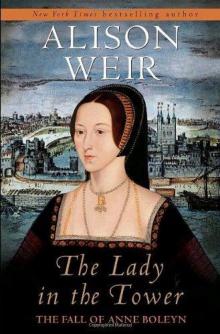 The Lady in the Tower: The Fall of Anne Boleyn
The Lady in the Tower: The Fall of Anne Boleyn Six Wives of Henry VIII
Six Wives of Henry VIII Elizabeth of York: A Tudor Queen and Her World
Elizabeth of York: A Tudor Queen and Her World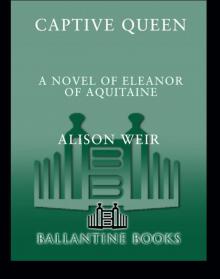 Captive Queen
Captive Queen Innocent Traitor
Innocent Traitor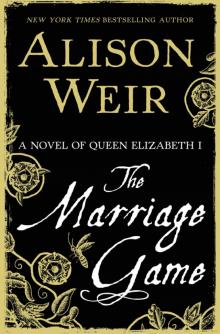 The Marriage Game
The Marriage Game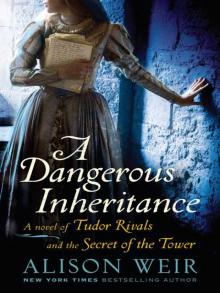 A Dangerous Inheritance
A Dangerous Inheritance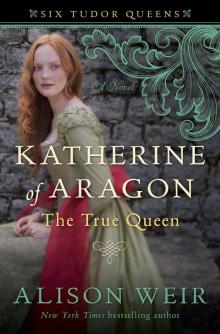 Katherine of Aragón: The True Queen
Katherine of Aragón: The True Queen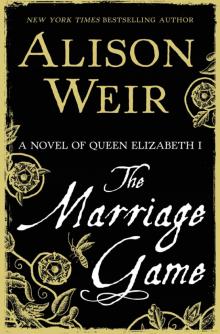 The Marriage Game: A Novel of Queen Elizabeth I
The Marriage Game: A Novel of Queen Elizabeth I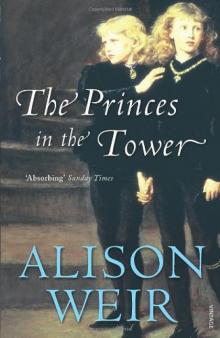 Princes in the Tower
Princes in the Tower Anne Boleyn: A King's Obsession
Anne Boleyn: A King's Obsession Traitors of the Tower
Traitors of the Tower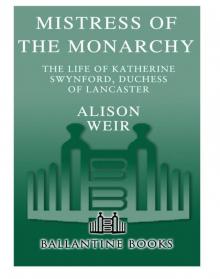 Mistress of the Monarchy: The Life of Katherine Swynford, Duchess of Lancaster
Mistress of the Monarchy: The Life of Katherine Swynford, Duchess of Lancaster Queens of the Conquest: England’s Medieval Queens
Queens of the Conquest: England’s Medieval Queens Eleanor of Aquitaine: A Life
Eleanor of Aquitaine: A Life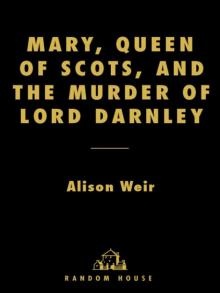 Mary, Queen of Scots, and the Murder of Lord Darnley
Mary, Queen of Scots, and the Murder of Lord Darnley Henry VIII: The King and His Court
Henry VIII: The King and His Court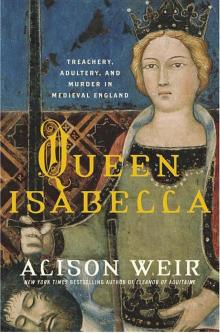 Queen Isabella: Treachery, Adultery, and Murder in Medieval England
Queen Isabella: Treachery, Adultery, and Murder in Medieval England Katheryn Howard, the Scandalous Queen
Katheryn Howard, the Scandalous Queen Arthur- Prince of the Roses
Arthur- Prince of the Roses The Wars of the Roses
The Wars of the Roses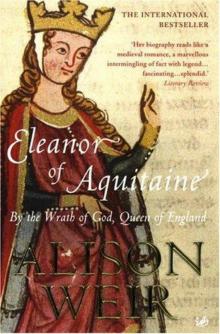 Eleanor of Aquitaine: By the Wrath of God, Queen of England
Eleanor of Aquitaine: By the Wrath of God, Queen of England Mary Boleyn: The Great and Infamous Whore
Mary Boleyn: The Great and Infamous Whore Jane Seymour: The Haunted Queen
Jane Seymour: The Haunted Queen Anna of Kleve, the Princess in the Portrait
Anna of Kleve, the Princess in the Portrait Lancaster and York: The Wars of the Roses
Lancaster and York: The Wars of the Roses The Grandmother's Tale
The Grandmother's Tale The Princess of Scotland (Six Tudor Queens #5.5)
The Princess of Scotland (Six Tudor Queens #5.5) The Lady Elizabeth
The Lady Elizabeth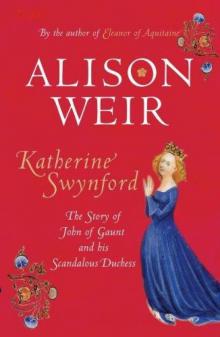 Katherine Swynford: The Story of John of Gaunt and His Scandalous Duchess
Katherine Swynford: The Story of John of Gaunt and His Scandalous Duchess The Curse of the Hungerfords
The Curse of the Hungerfords The Lost Tudor Princess: The Life of Lady Margaret Douglas
The Lost Tudor Princess: The Life of Lady Margaret Douglas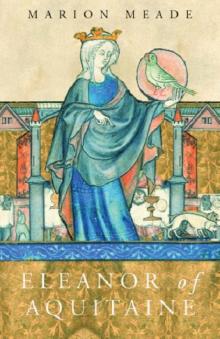 Eleanor of Aquitaine
Eleanor of Aquitaine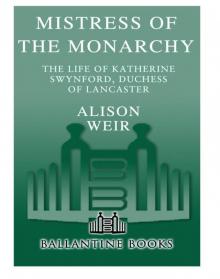 Mistress of the Monarchy
Mistress of the Monarchy The Lost Tudor Princess
The Lost Tudor Princess Henry VIII
Henry VIII Anne Boleyn, a King's Obsession
Anne Boleyn, a King's Obsession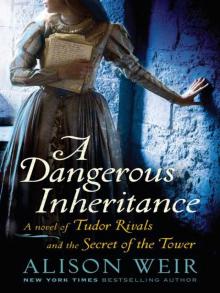 A Dangerous Inheritance: A Novel of Tudor Rivals and the Secret of the Tower
A Dangerous Inheritance: A Novel of Tudor Rivals and the Secret of the Tower Elizabeth of York
Elizabeth of York Katherine of Aragon, the True Queen
Katherine of Aragon, the True Queen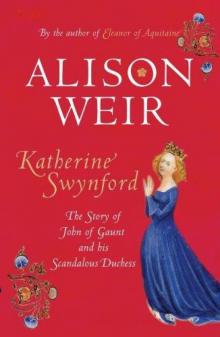 Katherine Swynford
Katherine Swynford Wars of the Roses
Wars of the Roses Queens of the Conquest
Queens of the Conquest Mary Boleyn
Mary Boleyn Britain's Royal Families
Britain's Royal Families The Tower Is Full of Ghosts Today
The Tower Is Full of Ghosts Today Life of Elizabeth I
Life of Elizabeth I Anne Boleyn A King's Obssession
Anne Boleyn A King's Obssession Lancaster and York
Lancaster and York Jane Seymour, the Haunted Queen
Jane Seymour, the Haunted Queen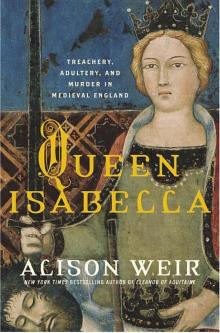 Queen Isabella
Queen Isabella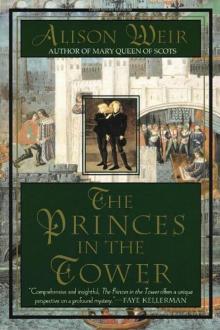 The princes in the tower
The princes in the tower